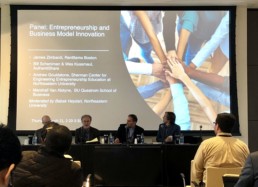Sharing Economy @ Northeastern University
I recently had the great pleasure of being a panel member at the SHARE Conference at Northeastern University.
Most people don’t realize the sharing economy is much bigger than Uber, Lyft, Airbnb, and VRBO. There is a world of academics, entrepreneurs, researchers, and groups of people that are passionate about improving the utilization of the items we already own.
“55 million Americans or 1/6 of the population used sharing services in 2017”
The following are three major takeaways from the SHARE Conference at Northeastern University.
1. Academic vs. Industry Perspectives
The perspective of the sharing economy by the research community compared to industry practitioners appears to be polarized. Practitioners tend to focus on the benefits of the sharing economy while many in the academic community are focusing on the negative effects on society.
As an industry practitioner, I mostly experience the positive impact the sharing economy is having. While those that track the negative impacts of the sharing economy allow industry practitioners like myself to have a more comprehensive understanding of the social, economic, and environmental impact that the sharing economy is having. It is this tug-of-war that allows for a holistic understanding of the true impact the sharing economy is having and how an organization like Rent Items is making both positive and negative contributions. Rent Items and its leadership is dedicated to maximizing the positive impact on our society, economy, and environment, and seeks to minimize the negative effects.
2. Reputation
The sharing economy players are faced with a major dilemma – perception versus the reality of their intentions. As sharing economy marketplaces grow stronger so does public perceptions of their intentions. For example, some people view Uber as the best thing that ever happened in the last two decades, while others perceive Uber as purposefully and intentionally contributing to major systemic social and economic problems. It very much depends on whom you speak to as to which version of brand reputation you will hear. Having a trustworthy reputation is paramount when it comes to establishing a marketplace that is making a contribution to the sharing economy.
At the Northeastern University SHARE Conference, I shared my conviction that most industry practitioners desire to create sustainable marketplaces with the best intentions and motivations. As a marketplace grows, it may seem like those intentions go out the door, but that is not necessarily the case. In many cases, marketplace leaders are struggling with difficult business and community-based decisions. Often, real tension exists between what is advantageous for the business and the community, creating a catch-22 situation. For example, a business decision to increase fees can appear disadvantageous to the community, but that does not mean the decision was made to hurt the community, but create a more sustainable and viable marketplace for the community.
The intent of the sharing economy leadership is very important to the reputation. More importantly, leaders in the sharing economy must continuously communicate with those communities they serve. The dialogue should be open, truthful, and transparent. Difficult topics should be raised and discussed. In doing so, best practices will evolve. In the example of Rent Items, people need to hear why so many people are dedicated to creating a sharing economy marketplace.
3. Regulations on Sharing Economy
Regulators, like innovators, typically have good intentions – to keep the public safe and the public’s interest in mind at all times. With that said, regulations can become a major challenge to innovation and innovators. As we have seen with Facebook, Twitter, Google, Apple, and others, it is a challenge to balance the maximization of shareholder value, user experience optimization, and privacy protection. A real tension and conundrum exist.
As the sharing economy matures, it is important that regulations don’t get instituted that stifle new ideas and innovation opportunities, but help keep a healthy balance between public interest and spurring on innovative organizations and disruptive ideas. Intentional or unintentional missteps should not result in penalizing all. Pioneers are learning as they go and will make mistakes. No business leader, organization, nor regulations committee is perfect. When bad missteps occur, leaders should address them as quickly as possible. Collaboration and understanding are critical to continue innovating while establishing ways to keep people’s interests safe and secure.
Final Thoughts
The sharing economy and marketplaces face many challenges, some foreseen and some unforeseen. However, I truly believe the benefits outway the challenges that need to be overcome. Are marketplaces and sharing economy players the solution to all social, economic, and environmental issues? Absolutely not! But, peer-to-peer marketplaces do provide new opportunities for people to develop stronger communities, greater economic opportunities, and less environmental waste.
It is the forethought of institutions such as Northeastern University and its faculty and students that provides a healthy dialog between industry experts, researchers, public regulators, and practitioners. I hope to engage in more discussions with those leaders that are working towards creating a more sustainable sharing economy in order to allow for more entrepreneurial activity to occur in the United States and beyond.
James is the CEO of Rent Items, Inc. In 2014, James became interested in the rental industry and the sharing economy. James has over 20-years of experience as a management executive. He holds a Bachelor’s of Business degree from Stetson University in Marketing and Information Technology and an MBA from Massachusetts Institute of Technology (MIT) as a Sloan Fellow in Innovation and Global Leadership.

